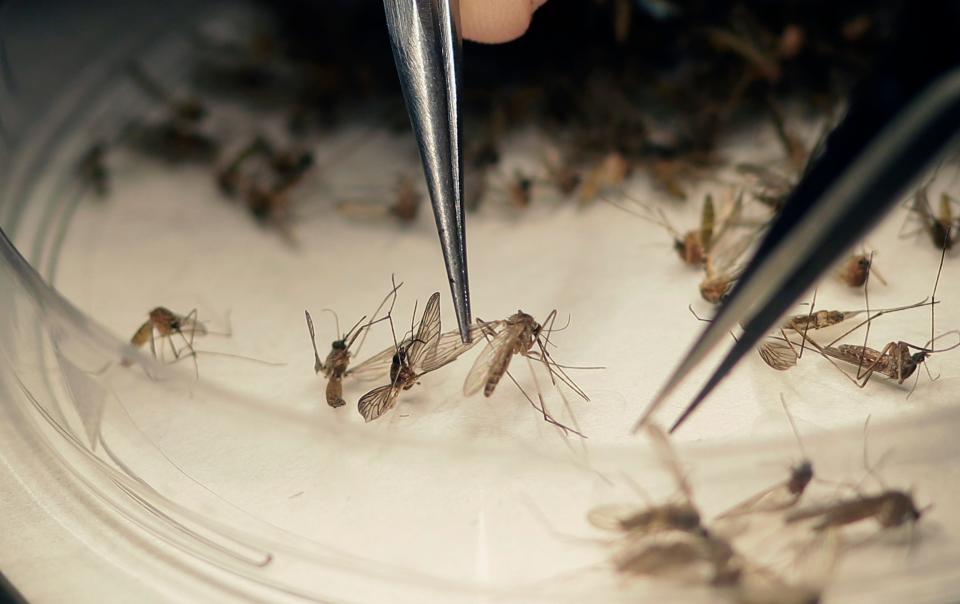Mosquitos that could carry Zika found in Des Moines and Lee counties, but none have tested positive for the virus
A collaborative study between Iowa State University, the Iowa Department Public Health and Des MoinesCounty Public Health has led to the discovery that a species of mosquitos capable of carrying the Zika virus has been found in Burlington.
Zika virus can be transmitted to humans via bites from infected mosquitoes. The most common symptoms of the disease caused by the virus are generally mild and include fever, rash, conjunctivitis, muscle and joint pain, and headache, but it can cause birth defects in babies born to infected pregnant women.
The Mosquito Surveillance Program, which at one time included all counties on the Illinois and Missouri borders, found the species of mosquito known to carry Zika in three counties: Des Moines, Lee and Polk County.

The paper, "Surveillance and Genetic Data Support the Introduction and Establishment of Aedes Albopictus in Iowa, USA," was published earlier this year.
“Our data support that Ae. albopictus are overwintering and have likely become established in the state,” the report reads.
The Ae. albopictus mosquitos are known for carrying the Zika virus, but do not carry malaria, another disease commonly associated with mosquitos. As of yet, none of the mosquitoes identified in Iowa counties have been found to be carrying the Zika virus. To overwinter means that a bug remains in the area and reemerges at the end of winter.
When talking to the board of supervisors Tuesday, Des Moines County Public Health Administrator Christa Poggemiller said there has only ever been one case of Zika virus in Iowa, and that was someone who had traveled out of the country. None of the mosquitos in the project were found to be positive for Zika virus.
A total of 3,700 of those mosquitos were found in the three counties. The mosquitoes were first found in 2017, the first year of collection for Des Moines County, and the numbers have increased each year through 2020.
The five-year study, which began in 2016, originally only included counties on the Missouri border. In 2017, counties along the Mississippi River were also added, as well as Polk County.
The study chose these counties due to colonies having already been found in Missouri and Illinois. According to the graph included in the study, Des Moines, Lee, Louisa and Polk counties participated in each year of the study in which they were eligible to do so.
Prior to this study, it had been found that these mosquitos had not survived the winters, leading to the belief that winters in Iowa are too harsh for the mosquitos to establish themselves in the state.
However, in this paper, researchers found that there is a likelihood that the mosquito population has established itself in Iowa. This would explain why mosquitoes were found in each year of the study.
While the mosquitoes were found in the three counties, they were found at different times of the year. The first discoveries varied, with the mosquitos being found in late August in Polk County and in late July in Des Moines County. The following year, the mosquitos were found in both counties in mid-June.
But Lee County’s discoveries looked different, with the first discovery in mid-July and in subsequent years as early as late May, accounting for about a third of all mosquitos trapped in Lee County.
Trap variability could also play a role, the researchers found. The traps associated with the project in Polk County were in one location that was determined to be the best place to capture them. However, mosquito traps in part of a different project yielded very few Ae. albopictus mosquitos.
In contrast, mosquito traps placed throughout Des Moines and Lee counties didn’t seem to hold much difference. All traps in the Greater Burlington area and Fort Madison had Ae. albopictus mosquitos at least some of the years during the project. Of the four sites within Keokuk, three had the mosquitos at least some of the time.
Almost all of the rural trapping sites did not have any Ae. albopictus mosquitos found throughout the four years they were placed.
Researchers suggested some sites where the mosquitos were found every year may suggest the bugs are establishing in these areas. In the case of trappings in Keokuk and Fort Madison, the authors concluded this could mean the mosquitos are spreading throughout Lee County to new locations.
This article originally appeared on The Hawk Eye: Mosquitos with potential to cause Zika found in Southeast Iowa

